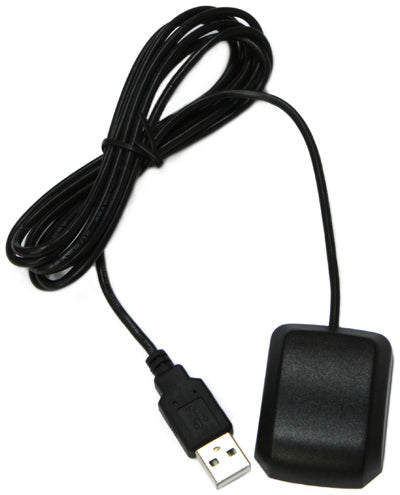Hardkernel
USB GPS Module
USB GPS Module
Order within the next 3h 9m 22s and we'll do our best to ship today, but weekend demand may delay some orders to tomorrow.
Note: Pre-order items or items that require assembly may ship later.
In stock
Couldn't load pickup availability
Description ▼
Add GPS Capability to your ODROID or other SBC running Linux or Android!
KEY FEATURES
Ublox chipset with patch antenna
- 50 channel u-blox engine
- GPS L1 C/A code
- SBAS: WAAS. EGNOS, MSAS
USB Interface ( /dev/ttyACM0 )
- GPS Protocol: NMEA 0183 position, velocity, altitude, status and control
- Consumed Power: 5V/100mA
Receiver Performance Data
- Tracking sensitivity: -160dBm
- Acquisition sensitivity: -146dBm
- Cold start: 32 sec. (average)
- Warm start: 32 sec. (average)
- Hot start: 1 sec. (average)
- Recapture: 0.1 sec. (average)
Mechanical Data
- Dimensions: 50 x 38 x 16 mm
- USB Cable Length: 2m (~6ft.)
- Mounting: Magnet
- Weight: 70g (~2.5oz.)
NOTES
- Systems with only a microUSB port available will need a USB OTG adapter cable to use this item.
LINKS
- Quick start guide for Linux - http://odroid.com/dokuwiki/doku.php?id=en:c1_usb_gps
Warranty is valid for two weeks, starting upon date of receipt.
Recommended Accessories ▼
Bundle Deals▼
Let’s Connect! We’re a small business passionate about helping you achieve your goals of comfort, privacy, and security with Home Assistant, Single Board Computers, and more. Get in touch for a free consultation or just a fun chat about what’s possible—we’ll do our best to guide you in the right direction and get you the best deal! As a small team, we’ll strive to be available or get back to you as soon as possible.
Share
SKU:E0095
View full detailsamerIDroid.com New Theme
We have received some feedback and released a new theme making our website simpler and better looking.
Trivia Time!
Play to win a discount!
This GPS module works pretty much as expected. I was able to access it as a serial device on the Linux device tree at /dev/ttyACM0 at 115200. From there, I could use some open source libraries to read the data stream into a buffer, represented as NMEA strings, and parse that into out the expected information.
This worked on both x86_64 desktop and ARM 64-bit Debian-like operating systems with no issues.


